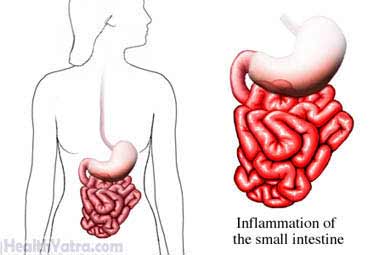Definition
Traveler’s diarrhea is diarrhea in people who travel to international destinations. It often happens in less developed countries.
Causes
The primary cause of traveler’s diarrhea is ingesting food or water that contains feces. The substance carries a bacteria, virus, or parasite that causes the diarrhea. Examples of agents that can cause the diarrhea include:
- Bacteria (most common cause)
- Escherichia coli, especially Enterotoxigenic E. coli (ETEC)
- Campylobacter
- Shigella
- Salmonella
- Viruses
- Rotavirus
- Norwalk virus
- Parasites
- Giardia lambli
- Entamoeba histolytica

The pathogen that causes the infection will partly depend on the area of travel.
Risk Factors
The most important risk factor for getting traveler’s diarrhea is the destination. Underdeveloped countries with unsafe water supplies pose the highest risk. The following factors increase your chance of getting traveler’s diarrhea. If you have any of these risk factors and plan to travel internationally, tell your doctor:
- People with weak immune systems
- People with diabetes or inflammatory bowel disease
- People who take acid blockers or antacids

Symptoms
Symptoms can include:
- Increased frequency and volume of stool
- Frequent loose stools (4-5 watery bowel movements a day)
- Abdominal cramping
- Nausea
- Vomiting
- Fever
- Bloating
Diagnosis
Your doctor will ask about your symptoms and medical history. A physical exam will be done.
A stool sample may be taken. This will allow your doctor to identify the pathogen.
Your doctor may direct you to self-treat if you are travelling to certain countries and have sudden moderate to severe diarrhea.
Treatment
Talk with your doctor about the best treatment plan for you. People who get traveler’s diarrhea usually get better within 3-5 days even without treatment. Treatment options include the following:
Hydration
It is important for people who have diarrhea to make sure they are drinking plenty of clear fluids. This will replace the fluids lost in the diarrhea. Some people may need to use an oral rehydration solution such as children and older adults who are more likely to become dehydrated.
Antibiotics
Antibiotics may reduce how long symptoms last by 1-2 days. These antibiotics are only helpful for treating infections caused by a bacteria.
Antimotility Agents
Antimotility agents may help relieve symptoms of diarrhea. Examples of these medicines include:
- Loperamide (Immodium)—Should not be used in children less than 2 years old, people with fever over 101.3 degrees F (38.5 degrees Celsius), and people with bloody diarrhea.
- Bismuth subsalicylate (Pepto-Bismol)—Should not be used in children, pregnant women, people with allergies to aspirin or salicylates.
If you are diagnosed with traveler’s diarrhea, follow your doctor’s instructions .
Prevention
To help reduce your chance of getting traveler’s diarrhea, take the following steps:
- Avoid eating foods from street vendors or unsanitary eating establishments.
- Avoid raw or undercooked meat or seafood.
- Eat foods that are fully cooked and served hot.
- Avoid salads or unpeeled fruits. Have only fruits and vegetables that you peel yourself, such as bananas or oranges.
- Do not drink tap water or add ice cubes made from tap water.
- Drink only bottled water with a sealed cap or, if necessary, local water that you have boiled for 10 minutes or treated with iodine or chlorine.
- Bottled carbonated beverages, steaming hot tea or coffee, wine, and beer are all okay to drink.
